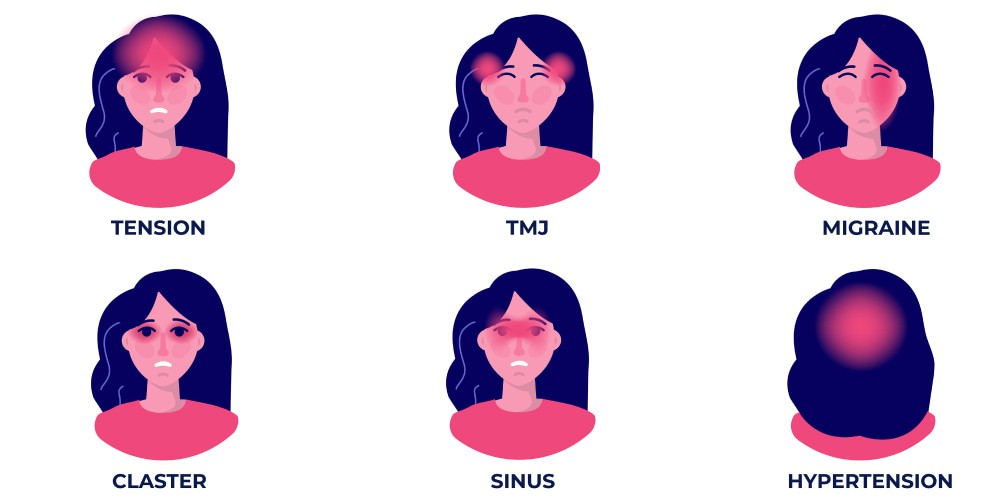We all face pulsating, distracting, annoying headaches sometimes. In addition, it usually appears at highly inappropriate moments. Mostly, headaches can go away independently and do not pose a major threat. However, there are situations when the headache is severe and repeats itself frequently, it is troublesome for the patient and interferes with his daily functioning. Regardless of whether the pain is dull, throbbing, or bursting, it is always related to the circulatory system. Headache is a condition that affects a very large part of the population, it can have different nature and be a consequence of many diseases. Headache is a fairly common condition that can arise from changes in atmospheric pressure, stress, or hormonal fluctuations. Sometimes, however, it accompanies more serious diseases or requires specialist pharmacological treatment.
While headaches are not only a women’s disease, men are in the minority here. Regardless of the type, a headache can be very troublesome, especially if it lasts too long. Then it significantly hinders everyday functioning. Severe and frequent headaches should be diagnosed by a specialist.
Why do we have a headache?
The most common causes of headaches include:
- fatigue;
- mental exhaustion;
- problems with cerebral circulation;
- vascular changes;
- disturbed metabolism;
- diseases of other organs of the body, within or in the vicinity of the skull (e.g. otitis media, inflammation of the paranasal sinuses).
Headaches are usually divided into spontaneous and secondary pain. Spontaneous pains occur more often. We also call them primary pains, like cluster pains, migraines, and tension headaches, in which the essence is the pain itself. Many patients associate a headache with a typical migraine, but it is not the main cause of spontaneous pain. The tension headache, the cause of which has not been clearly defined so far (it probably consists of many factors: genetics, lifestyle, or the environment where we live, smoking, alcohol abuse) is the most common pain.
Headache also occurs during pregnancy and is the result of changes in the hormonal balance. It can accompany a disease entity, like sinusitis or ear infections, influenza, arterial hypertension, meningitis, degeneration of the spine, brain tumor, or carbon monoxide poisoning.
Symptomatic headaches (where the pain is non-specific) may be a characteristic of other disease entities, the pain may have a different form, location, or duration. Treatment of headaches is about fighting and preventing attacks.
There are different ways to treat a headache, depending on the cause of the pain and its severity.
By localization, headache can be divided into:
- pain in the back of the head – often a consequence of arterial hypertension and overload of the cervical spine;
- frontal headache – most common in migraines and tension headaches. It may also indicate paranasal sinusitis;
- pain on the left or right side – unilateral headache in most cases is associated with migraine or cluster seizures;
- temporal pain has many causes, including viral or bacterial infections, blood vessel disease, brain tumors, migraines, and tension headaches.
How to deal with a headache?
There have been many treatments for headaches. They can be divided into two groups:
- Conventional (pharmacological)
- Alternative
What are the conventional headache treatments?
The methods used to treat headaches can be divided into two groups:
- pain-relieving – over-the-counter non-steroidal anti-inflammatory drugs such as ibuprofen and naproxen sodium are used;
- prophylactic treatment – various groups of drugs are used in the case of chronic tension headache, mainly antidepressants. The beneficial effects of drugs used in the treatment of epilepsy have been confirmed in some patients.
The patient should consult a doctor to select an effective and appropriate agent for each organism. Choosing the best treatment option will help you overcome tension headaches and minimize the risk of side effects.
The research results confirm that the therapy combined with behavioral techniques is the most effective in reducing the frequency of pain episodes and their duration. Stress management techniques are recommended for patients suffering from tension headaches.
What are the alternative headache treatments?
Many patients find relief from tension headaches with unconventional treatments. These methods do not always reduce the severity of the pain itself, but they eliminate the discomfort and psychological tension that accompany tension pains. The effectiveness of such methods is individual, and in the fight against tension headaches, may help:
- drinking in small sips of cool water – drink a liter per hour;
- walk and take deep breaths;
- soak feet in cold water;
- put cold deposits on the forehead and temples;
- acupressure;
- do aromatherapy practicing;
- use herbal infusions;
- do warm bath relaxing;
- neck and shoulder massage;
- practice feedback methods based on training the brain to obtain biological feedback;
- spend some time having a rest in a darkened room.
If you suffer from bothersome headaches, you shouldn’t take them lightly. A visit to a neurologist, correct diagnosis, and selection of the right treatment method will help you overcome headaches and improve your quality of life.











Please, leave your review
Write a comment: